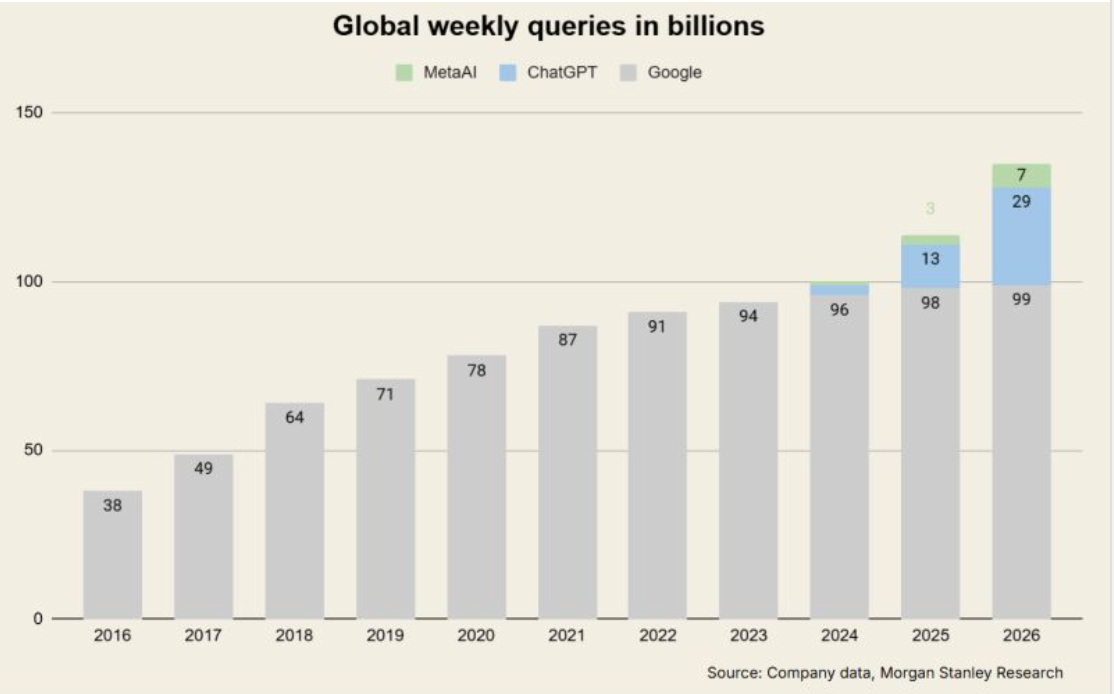AI Part II: Is AI changing how we search?

- Jack Carr
- Reading time: 6 minutes
Over the past year, the way people search online has rapidly evolved. It’s not just Google anymore. Platforms like ChatGPT, Meta AI, Google’s own AI Overviews, and other AI-powered tools are fundamentally changing how users approach product research, service discovery, and decision-making.
This shift is about more than algorithms or ad formats. It’s about a deeper change in user behaviour.
One of the clearest signs of this behavioural shift is how users now in a lot of instances expect immediate, contextually rich answers, rather than a list of links to explore. For that reason, many now begin their journey inside AI platforms like ChatGPT or voice assistants, especially when they’re not looking for a brand or a particular product, but a solution or recommendation.
This shifts discovery away from traditional search engines toward conversational interfaces. Users aren’t just typing keywords as often any more. They’re asking questions, refining follow-ups, and getting curated responses.
There are wide-reaching implications, especially for how brands think about visibility in the digital space.
However, the answer isn’t quite as straightforward as that. In many cases, the emergence of these platforms has allowed users to explore completely new queries, leading to an overall growth in the search market, rather than a decline. The increased capabilities of generative AI has expanded the ways in which information exchange can happen, which in turn has led to an evolution in how we search (Source: Fletcher.io). Morgan Stanley’s recent research on the topic highlights this (see image below).

For now, it appears AI is bringing incremental volume to the search query space. However, as use of platforms like ChatGPT become habitualised, we will likely see eventual encroachment into Google’s long ring-fenced space.
In traditional search, users move from:
→ Keyword → Results → Click → Read → Decide
Often repeated multiple times.
AI compresses this to:
→ Prompt → Answer → Refine Prompt → Improved Answer
This means:
“contract template UK startup”
Then choosing a result, reading, copying… They now ask:
“Write me a founders’ agreement for a UK startup with equity split.”
The AI gives them the result immediately. This isn’t just replacing one search. It’s replacing the need for many. The nature of our queries is becoming more instructional. In doing so the AI platforms are able to do a lot of the heavy lifting for us.
This is a significant challenge for brands to navigate.
The AI’s recommendations shape perception. If ChatGPT or Google’s AI Overview only mentions 3 providers, that list becomes the shortlist. Visibility becomes binary. You’re in the answer or you’re invisible.
Fundamentally, the answers reduce the need for users to click and explore multiple sources. As a result, users scroll less, and are less likely to visit individual websites.
For now, this is especially concerning for: Publishers and blogs relying on click-through traffic Niche service providers who previously relied on long-tail keywords Comparison content and review aggregators (some of which are seeing traffic decline as AI replaces their utility) The future of the human ability to disseminate information and come to one’s own conclusion (but perhaps this is a problem for another day).
AI isn’t just changing what shows up in search. It’s changing why people search, how they search, and where they begin. All the while expanding the amount of searching that we do.
For marketers, SEO specialists, and ecommerce managers, this is a call to adapt. Not by abandoning Google or chasing gimmicks, but by understanding the deeper shift in how people solve problems, make decisions, and find what they’re looking for. We’ll be addressing exactly what this looks like in our final article next week.
The future of search is becoming less about keywords, and more about being the answer the AI trusts.
From Links to Answers: The Rise of AI as a Starting Point
One of the clearest signs of this behavioural shift is how users now in a lot of instances expect immediate, contextually rich answers, rather than a list of links to explore. For that reason, many now begin their journey inside AI platforms like ChatGPT or voice assistants, especially when they’re not looking for a brand or a particular product, but a solution or recommendation.
This shifts discovery away from traditional search engines toward conversational interfaces. Users aren’t just typing keywords as often any more. They’re asking questions, refining follow-ups, and getting curated responses.
There are wide-reaching implications, especially for how brands think about visibility in the digital space.
Is it replacing traditional search engines?
One concern with AI search is query cannibalisation. Are AI tools replacing traditional searches? Apple Exec Eddy Cue recently revealed that search query volumes on iOS devices (where Google is the default search engine) had dropped for the first time in decades, with users turning to generative AI tools instead (Source: MLex).However, the answer isn’t quite as straightforward as that. In many cases, the emergence of these platforms has allowed users to explore completely new queries, leading to an overall growth in the search market, rather than a decline. The increased capabilities of generative AI has expanded the ways in which information exchange can happen, which in turn has led to an evolution in how we search (Source: Fletcher.io). Morgan Stanley’s recent research on the topic highlights this (see image below).

For now, it appears AI is bringing incremental volume to the search query space. However, as use of platforms like ChatGPT become habitualised, we will likely see eventual encroachment into Google’s long ring-fenced space.
The Discovery Journey is Being Collapsed
In traditional search, users move from:
→ Keyword → Results → Click → Read → Decide
Often repeated multiple times.
AI compresses this to:
→ Prompt → Answer → Refine Prompt → Improved Answer
This means:
- Fewer touchpoints
- Fewer brand impressions
- Less opportunity to influence via traditional content marketing or paid ads
“contract template UK startup”
Then choosing a result, reading, copying… They now ask:
“Write me a founders’ agreement for a UK startup with equity split.”
The AI gives them the result immediately. This isn’t just replacing one search. It’s replacing the need for many. The nature of our queries is becoming more instructional. In doing so the AI platforms are able to do a lot of the heavy lifting for us.
This is a significant challenge for brands to navigate.
Less Scroll, More Summary
The AI’s recommendations shape perception. If ChatGPT or Google’s AI Overview only mentions 3 providers, that list becomes the shortlist. Visibility becomes binary. You’re in the answer or you’re invisible.
Fundamentally, the answers reduce the need for users to click and explore multiple sources. As a result, users scroll less, and are less likely to visit individual websites.
For now, this is especially concerning for: Publishers and blogs relying on click-through traffic Niche service providers who previously relied on long-tail keywords Comparison content and review aggregators (some of which are seeing traffic decline as AI replaces their utility) The future of the human ability to disseminate information and come to one’s own conclusion (but perhaps this is a problem for another day).
Final Thoughts
AI isn’t just changing what shows up in search. It’s changing why people search, how they search, and where they begin. All the while expanding the amount of searching that we do.
For marketers, SEO specialists, and ecommerce managers, this is a call to adapt. Not by abandoning Google or chasing gimmicks, but by understanding the deeper shift in how people solve problems, make decisions, and find what they’re looking for. We’ll be addressing exactly what this looks like in our final article next week.
The future of search is becoming less about keywords, and more about being the answer the AI trusts.
